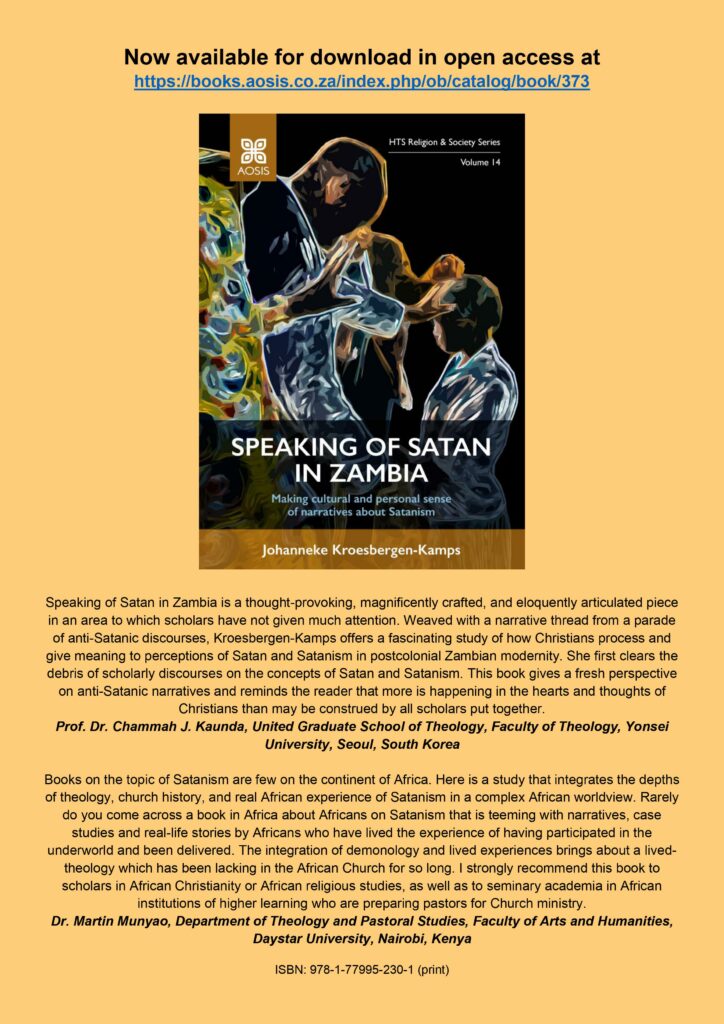On a Sunday afternoon in a Pentecostal church in Zambia, you may find an ex-Satanist confessing to the most heinous acts of evil. Ex-Satanists, often adolescents and mostly girls, give testimonies in which they relate how they were unwittingly initiated into Satanism, completed assignments for the devil such as causing traffic accidents, illnesses and marriage problems in exchange for material gains and status. Eventually, they were delivered to become born-again Christians and share their story with Christian audiences. These testimonies tie in with other narratives about wealth and (political) power gained through the illicit help of evil spiritual powers.
Narratives about Satanism have a relatively short history in Zambia – the first instances are from the 1990s, and the narratives started to become widespread in the 2000s. Speaking of Satan in Zambia argues that Zambians are receptive to these narratives for several reasons. First, these narratives about spiritual evil make cultural sense. A hybrid of traditional notions of witchcraft, possession and illicit accumulation, together with Christian theology, in particular of a neo-Pentecostal type, makes the idea that an organisation of evil exists plausible to Zambian Christians of a Pentecostal predilection. The notions of potentially harmful spiritual agents (such as witches and spirits) and spiritual means of causing harm (for example, to gain extraordinary wealth or power) have a long history. In missionary Christianity, all spiritual powers became connected to the Christian image of the devil. The fight between God and Satan has received new emphasis in contemporary neo-Pentecostal spiritual warfare theology. In Africa, spiritual warfare entails the idea that traditional spiritual beings and powers fight on the side of Satan. Furthermore, the sudden rise in the occurrence of narratives about Satanism is a sign of changes and anxieties in Zambian society. Because the narratives about Satanism fit so well with these different ideas, they make cultural sense and are deemed plausible by Zambian Christians.
For some, the narratives also make personal sense. For ex-Satanists, mainly adolescents and particularly girls, Satanism is an affliction. It is not a conscious choice or a matter of conversion to a different religious ideology but something that inadvertently befalls someone. The diagnosis of Satanism is provided by neo-Pentecostal pastors or intercessors and is related to behaviour that is deemed abnormal as well as feelings of isolation and rejection. This diagnosis does not appeal to everyone. But for some, it becomes the basis for a new evaluation of one’s life and a new life story. If narratives about Satanism make personal sense, it is because they provide a meaningful interpretation of the lived reality of the ex-Satanists.
Receptivity to narratives about Satanism is reinforced by their use in public religious gatherings. Testimonies are produced and performed in Christian settings, in which the ex-Satanists learn to narrate their experiences in a way that fits within the genre of testimonies of Satanism. Pastors act as important sponsors of this narrative by creating opportunities where ex-Satanists can share their testimonies while giving authoritative interpretations of these stories. For the pastors, narratives about Satanism have a clear appeal. Testimonies function as proof for the pastor’s spiritual warfare theology and of his ability to wage war against the powers of Satan. In Zambia’s competitive religious environment, this is a crucial matter. For audiences, testimonies make the divine and the demonic real. They also provide a space to play with ambiguous experiences, for example, the desires as well as the fears related to changes brought by development and contact with Western modernity.
The comprehensive focus on narratives about Satanism in Zambia offers new insights and enhances current theoretical reflection in the academic study of religion in Africa, in particular of African Christianity and of witchcraft-related phenomena, as well as to the global study of discourses on Satanism and other conspiracy theories. All of these disciplines are related to the topic of Satanism in Zambia, but the phenomenon itself has not been discussed at length, which makes the existing academic literature incomplete and inadequate. If you want to know more about the African concept of Satanism and Christianity in Africa in general, you should read this book!
The book is available in open access here.
Johanneke Kroesbergen-Kamps received her PhD for her research on Satanism in Zambia at Utrecht University in 2018 with Prof. Dr. Birgit Meyer. This book is an extensively reworked product of that research. Currently, she works as a lecturer in Religious Studies at the Universiteit van Amsterdam.

